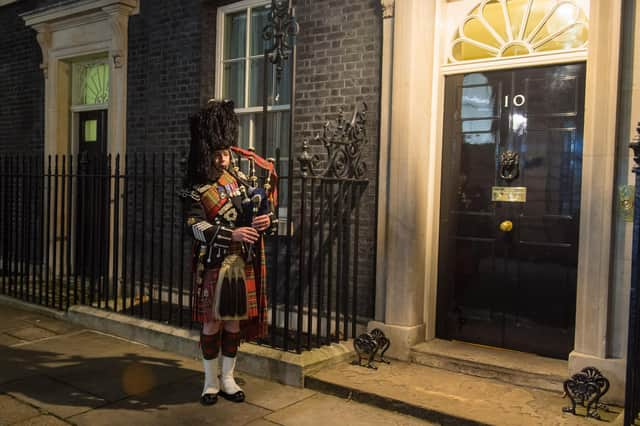Scottish independence: Scots living in rest of UK should be allowed to vote in any future referendum – Alastair Stewart


In the run-up to the 2016 referendum, I worked for organisations committed to keeping Britain in the European Union. I was abroad at the time, and had a vested interest in my rights being protected. This argument branched out into a petition calling for Members of Parliament for British expats across the globe.
The campaign made a clear and basic argument: the estimated 5.5 million citizens living and working abroad are still British. And political decisions at home can still have severe and undermining ramifications for them.
Advertisement
Hide AdAdvertisement
Hide AdAnd while people can mouth off that expats left to 'live in the sun', under present legislation, they still have a right to vote for 15 years. That period is an arbitrary cut-off. There are few reasons why Scots, living elsewhere in the UK, could not be granted an independence vote. It's the 'should they' that's stopping political action.
Before 1985, British citizens living abroad couldn't vote in UK parliamentary elections. In the 1970s, there was political pressure to extend the voting franchise to expats. By 1983 the Home Affairs Select Committee recommended that all UK citizens resident in the European Economic Community be given voting rights.
Margaret Thatcher's government introduced a Bill proposing a seven-year limitation to British electors overseas. The final legislation – the Representation of the People Act (1985) – limited the cap to five years. However, after the 1987 general election, and due to limited overseas registration, the Thatcher government recommended a 25-year cap. This was reduced to 20 years in the Representation of the People Act (1989).
By 1998, the Home Affairs Select Committee called for a reduction to five years, arguing that UK residents away for so long lose a legitimate connection to home. The Political Parties, Elections and Referendums Bill (1999-2000) reduced the limit to 10 years, albeit an amendment for 15 years was passed. And here we are.
So why is it so hard to acknowledge that Scots living in the rest of the UK, which the SNP government wants to make overseas citizens overnight, have a stake in the independence question? Issues like defence, the economy, pensions, immigration, tax – it is precisely the same situation which the same UK Government has pledged to resolve for Brits overseas.
Johnson's government has followed through on Theresa's May's promise to introduce 'Votes for Life’ – abolishing the arbitrary time limit. The changes, forming part of the Elections Bill, are a significant move to acknowledging the impact of politics at home for citizens abroad.
Consider the impact of Brexit on voter uptake. According to the Office for National Statistics, the number of registered overseas voters had never risen above 35,000 before 2015. However, in the run-up to the general election of the same year – which placed the EU referendum front and centre – the number jumped to 285,000.
It is not gerrymandering to suggest the 800,000 Scots living across the rest of the UK should comment on decisions affecting their livelihoods and circumstances. But there will be complications that were not present during the Brexit vote.
Advertisement
Hide AdAdvertisement
Hide AdWho exactly is a ‘Scottish national’ – someone born here, someone with property here, someone (as in the case of the Spanish criteria for taxation) who spends a set number of days in Scotland? Does there need to be a blood connection?
It also opens the door to the fact that all UK citizens would be affected by the constitutional split between Scotland the rest of the United Kingdom (which, likewise, would become a new country overnight).
All of us, both at home and abroad, have been affected by Brexit in one way or another. However, that blurred point was relegated as too complicated. It was replaced with the outrageously simple binary of choice of yes or no, with no ifs and certainly no buts.
The situation is absurd when you consider the steps other countries take to protect the democratic rights of their citizens abroad (in this case, Scots living elsewhere in Britain).
In France, there are 11 seats to represent the 2.5 million French citizens living abroad. The French even have an Assembly of French Citizens Abroad, representing all French citizens living outside France. It also advises the government on issues particular to French nationals overseas.
Macedonia elects three out of 123 seats to represent overseas citizens from three constituencies (the Americas, Europe-Africa and Asia-Oceania). The Italian Parliament elects 12 representatives to the Chamber of Deputies and six to the Senate of the Republic from four electoral zones (including Europe).
The American Citizens Abroad organisation campaigns to introduce dedicated congressmen and senators for the nine million US citizens worldwide because of "the special issues they face, the growing complexities of the global markets and the role that Americans overseas play in the competitiveness of the United States”.
Scots living across Britain will be at the forefront of any constitutional changes in Scotland and should rightly have a say. If that is politically uncomfortable based on assumptions of how they might vote – tough.
Advertisement
Hide AdAdvertisement
Hide AdIf the SNP are as inclusive as they claim to be, how can they be so blind as to the practical realities of policies made far away? It is an irony, for a pro-European, anti-Brexit, anti-Westminster party.
Alastair Stewart is a freelance writer and public affairs consultant. Read more from Alastair at www.agjstewart.com and follow him on Twitter @Agjstewart
A message from the Editor:
Thank you for reading this article. We're more reliant on your support than ever as the shift in consumer habits brought about by coronavirus impacts our advertisers.
If you haven't already, please consider supporting our trusted, fact-checked journalism by taking out a digital subscription.
Comments
Want to join the conversation? Please or to comment on this article.
